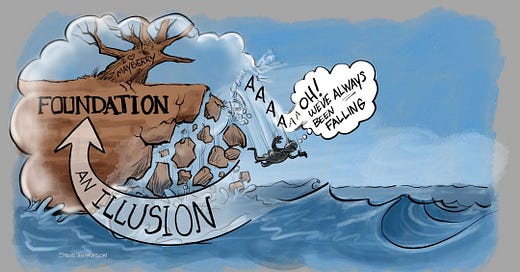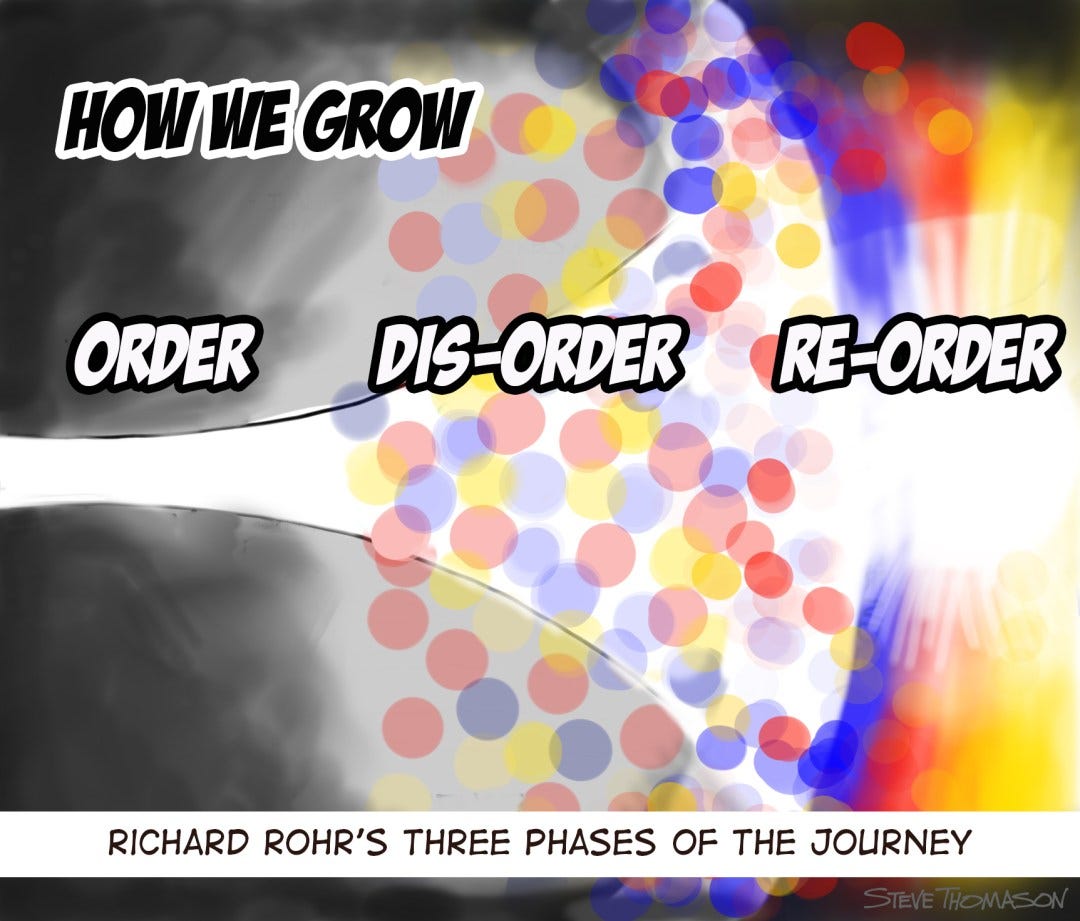When you hear the word fall, you probably think of a downward motion.
Fall is almost always followed by down. Gravity, which causes objects to free fall, is intuitively understood as a downward force. Even our current season of Fall takes its name from the annual phenomenon of dead leaves falling down from trees.
Falling can be scary.
I’ll never forget many of the times I’ve fallen. I’ve got a bit of a clumsy streak in me (which I’m more recently discovering could be the result of Dyspraxia stemming from my neurodivergent brain!), and I have fallen down a partial flight of stairs more often than I care to admit.
One stairfall occurred the night after moving into the home that now belongs to my ex-wife. I was descending the stairs in the dark after fetching something for a child (I cannot remember whom), and my hand reached the end of the handrail. In every other home in which I’d lived, that indicated the bottom of the stairs.
Unfortunately, that wasn’t true of this house.
I stepped out onto what I believed was the ground floor and found nothing but air. And I proceeded to tumble down at least six steps. All hardwood flooring. Good solid hardwood flooring.
My knee still isn’t right.
More recently I had to jump back on blood thinners in order to deal with my second blood clot in three years (yes…ugh). While walking down the stairs from my attic, I stumbled and tumbled down three stairs, clocking my head on a bookshelf. Fortunately, my forearm took the brunt of the fall. Wicked bruise there, but no intracranial hematoma.
I’ll call that a win.
Then there’s the car accident in 1998. We won’t go into those details now, but I was in bed long enough with serious enough injuries that I had to learn to walk again. When you stand for the first time in two months, the floor looks about ten stories down. And you are terrified of falling.
There’s a reason you learn to walk when you’re tiny.
Strangely enough, the fear has little to do with the direction that you’re going.
Deconstruction can feel like falling.
I was recently at Theology Beer Camp 2023 in Springfield, Missouri. On Saturday morning we were treated to Ethics after Deconstruction, a marvelous tag team talk by Dr. Reggie Williams and Dr. Aaron Simmons.
Quoting from Steve Thomason’s masterful visual summary of this presentation:
Simmons stood on the edge of the stage and looked down. “Kierkegaard,” he told us, “said that life is like standing on the edge of the abyss and looking down. We hold on to our past as long as we can. But when we fall, we realize that we have always been falling and the sure foundation we thought we were clinging to has always been an illusion.”
This is a terrifying moment.
I find two startling elements to Kierkegaard’s statement:
Any sure foundation we think we have in life is an illusion.
All of life is in fact a continual falling - something we cannot escape; something we must embrace.
Paradoxically, we can describe the journey of Deconstruction as falling upward.
Falling Upward, by Richard Rohr, provided me with a helpful framework for understanding my deconstruction journey.
Rohr describes two halves of life – halves not of time, but of spiritual focus. The first focuses on ego work, while the second focuses on soul work. The two halves are separated by a traumatic but transformational fall through liminal space.
There’s no such thing as an “average age” when these violent transitions occur. One can start this journey in their teens, their golden years, or anything in between. What’s almost certain is that this journey will occur. And you can be comforted by the fact that it’s absolutely normal.
In a sense, it’s just a part of growing up.
Rohr would label these three phases Order, Dis-Order, and Re-Order.
I’ll have much more to say about this framework in the coming weeks and months, including an exploration of its cyclical nature. But let’s keep it simple for now. What I love about this framework is that it allowed me to focus on the work of Deconstruction rather than continuing to be freaked out by the phenomenon itself.
A couple of years after reading Falling Upward, I wrote the atomic essay that inspired the piece you’re reading now. In that piece, I described these phases in terms of our interactions with “our Box.” I drew this metaphor from our common idiom, thinking inside/outside the box, and I still find it helpful.
Let’s examine each of these phases.
#1: Building Our Box (Order)
During the first half of life, we are building our box.
Our box represents our ego’s needs: identity, security, boundaries, order, safety, etc. We form our conceptual understanding of how the world works and how to behave in that world. We choose our friends, our careers, and perhaps our life partners.
This phase isn’t optional. Whether we build good structures or bad structures or both, we must build structures. We enter this life with what feels like a blank canvas (I find blank canvases paralyzing!), entirely dependent on our parents and/or other mature humans for our survival. Without the foundation of the box they help us to build, we won’t survive. The world is simply too complex and too dangerous.
As Maslow described in his “Hierarchy of Needs,” without our physiological and safety needs met, we have absolutely no viable path to self-actualization.
We have to begin at the beginning, and that starts with a place for everything and everything in its place.
#2: Discovering the Limits of Our Box (Dis-order)
Eventually, we encounter something our box cannot contain.
An anomaly. A contradiction. Something just doesn’t track and it requires us to literally think outside the box!
We fight and we struggle to make it fit, but we find the task impossible. The world simply doesn’t work the way we thought it did.
And so we fall upward.
I don’t recall if Rohr made this connection or not, but my mind is immediately drawn to the phrasing often uttered by clergy during rituals of baptism by immersion.
We are buried with Jesus through Baptism unto death, raised to walk in the newness of life.
I’ve been dunked twice. We’ll get to that later. But I immediately recall the feeling of being pushed under the water. You’re not in control. The baptizer is. It’s almost as if you’re falling. And just as you start to realize what’s happening, there’s a jerk.
And you start falling in the other direction: Upward.
#3: Filling Our Box (Re-order)
Upward to the second half of life, when we stop building and start being.
We stop trying to prevail. Rather than fear mystery and uncertainty, we embrace them. We stop wearing masks. Rather than hide our true selves, we reveal them. Rohr calls this a second simplicity, a return to child-like innocence coupled with mature wisdom.
We rest knowing that God is found somewhere within the universe, giving it purpose and direction. And we learn to trust reality, rather than trying vainly to protect ourselves from it.
And that’s where we’re going to leave off for now. My brain is a bit tired, and I bet yours is as well. Let’s take a break!
I could probably write a deeper dive into each of these phases in the future. If that or anything else resonates, please do let me know in the comments! Cheers!






